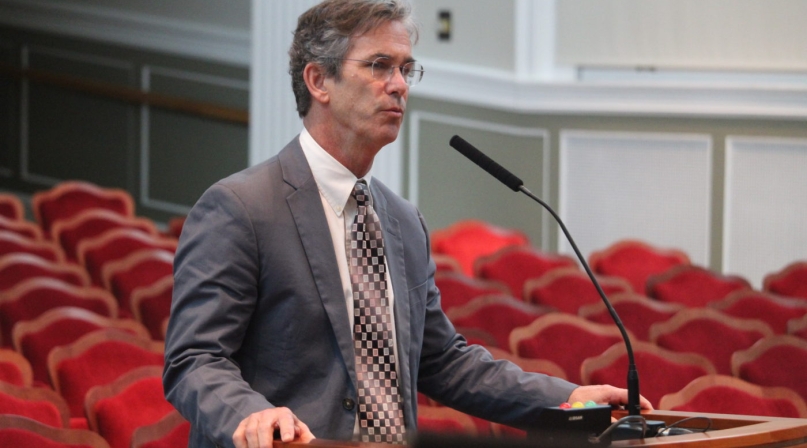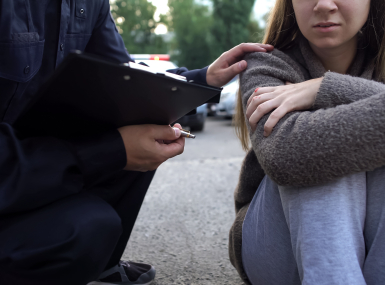County aims to sharpen justice data tools through initiative

Key Takeaways
In justice policy, data is currency. Or perhaps more accurately, data is the cotton and linen that money is printed on. Using it gives it value.
Albemarle County, Va., along with the city of Charlottesville, is one of 10 counties selected for the Convening County, Court and Justice Leaders initiative. Those counties will receive ongoing technical assistance and establish a peer network. Their results will also be featured in a national toolkit. And Neal Goodloe is hoping that process will help capitalize on a wealth of data that the Albemarle-Charlottesville Regional Jail has collected on incidents of mental illness among users.
“Data is a very powerful tool for making good decisions, [but] data itself doesn't change anything,” he said. “Our next big steps are to start to understand how we use that to really place some intelligent bets on where we put our resources, where we put our staffing to get the biggest bang for our buck.”
County, Court & Justice Leaders Initiative selects 10 sites
Ten counties will establish a peer network and receive ongoing technical assistance and the opportunity to showcase results in a national toolkit through the 2022 Convening County, Court & Justice Leaders: A Framework for Cross-System Collaboration Initiative. Sites will receive ongoing technical assistance, establish a peer network and the opportunity to showcase results in a national toolkit. The participating counties are Albemarle County and City of Charlottesville, Va.; Berrien County, Mich.; Cambria County, Pa.; Cuyahoga County, Ohio; Gallatin County, Mont.; Lake County, Colo.; Mesa County, Colo.; Navajo County, Ariz.; Potter County, Pa. and Rockdale County, Ga.
Goodloe is a criminal justice planner for the Jefferson Area Community Criminal Justice Board, which serves Charlottesville and Albemarle and Nelson counties in central Virginia.
“The goal of our NACo work is to help us make some sense of the data that we have, to create consensus around the best use of the (evidence-based decision making) EBDM’s (evidence-based decision-making’s) considerable influence, even though it’s all informal influence. We don’t have any power other than the power of the accumulated knowledge and reputation of the people in the room, but that packs a punch.”
The criminal justice board is hoping to start 2023 with a fully-fledged strategic plan, with focused and targeted goals and action steps.
Over six years, the jail has screened 10,000 people for signs of mental illness and found that approximately one-third met the minimum screening criteria for serious mental illness.
“They tend to stay longer, they tend to return to custody more frequently and they tend to fail while under probation supervision at higher rates than those who do not meet those screening criteria,” Goodloe said.
The University of Virginia’s systems engineering department and Institute of Law, Psychiatry and Public Policy have crafted a research design program that would resolve HIPAA (Health Insurance Portability and Accountability Act) obstacles in the sharing of personally identified information with regard to jail inmates, probationers and consumers of behavioral health services. That allowed researchers to merge these data fields to better understand what percentage of individuals with mental or behavioral illness can be successfully linked to community-based mental health services after their release.
“Without UVA and without the Institutional Review Board protocols that protect the information, it would be unlawful to do it, so what’s important for some of these other counties to understand is if you have a university that will partner with, you can learn things about your system that otherwise would not be lawful to know,” Goodloe said.” Before that, we had no way to really start understanding how all of these pieces fit together.”
In 2019, the Albemarle County Board of Supervisors and Charlottesville City Council funded a diversion program for low-level defendants, which would ensure them adequate treatment and supervision.
“They knew they would have to face a judge every two weeks, very similar to a drug court model,” Goodloe said. “It’s been an enormous success, but it’s been so successful that we’ve outgrown our funding and we now have more people who are being referred and more people who are being considered appropriate for this behavioral health docket.”
The Board received a $250,000 grant from the Charlottesville area Community Foundation to implement a treatment strategy once people’s mental illness was identified.
“We’d have a conversation, help them understand what their options are both inside the jail and once they’re released to receive help,” Goodloe said. “At least an evaluation of their mental health status, maybe get put on the medication, hopefully get linked up with our local behavioral health agency once they’re released. To try and help them have a successful reentry in the community.”
Soon after, of course, the COVID-19 pandemic limited access to jails in an effort to limit spread, and interaction with service providers was handled remotely.
More of the data the Board has collected indicates a doubling, between 2015-2021, in the number of individuals “screening in.”
“Part of that is the stress of COVID itself,” Goodloe said. “The bad news is that that probably means there are more of them that need mental health care but the good news is it looks like more of them are actually getting it.”
At this point, Goodloe said, “We have 10 years’ worth of data on virtually everything you could possibly want to know. Bookings, average length of stay, expenditures, by race, by age, by gender, by jurisdiction, by charge time…”
So, now that the raw material is there for insight, Goodloe and his colleagues across the country are aching for help in making something out of it.
“In criminal justice, we are data rich, but we are analysis poor,” he said. “There are people at every single desk, in every probation office, in every jail in every courtroom in the country, just piling data into systems as we speak.”
One impediment to doing more with that data, he said, is the fear that it will reflect poorly on the jail system without larger context that is only visible with more data sharing.
“People are afraid — ‘I'll give you my data, but you might end up, you know, highlighting something that’s bad,’ and that underlies the sense of distrust people have about sharing data. Until we start sharing data and integrating it, everybody is looking through a drinking straw.”
In the end, Goodloe hopes all of that data sharing and analysis will add up to better results for people who generate those numbers.
“Our goal is to identify those people who need help, offer them that help knowing that ultimately they have to make the decision to change their lives,” he said. “I see our role as creating the optimal conditions under which that change might take place.”
Attachments
Related News

SBA issues new rule affecting local permitting in post-disaster rebuilding
The U.S. Small Business Administration (SBA) has issued an interim final rule that changes how rebuilding projects financed with SBA disaster loans following a Presidentially declared disaster interact with state and local permitting requirements.

House passes legislation to increase the Crime Victims Fund
On January 12, the House passed the Crime Victims Fund Stabilization Act (H.R. 909) by a voice vote.

